Boyle J.A. The Cambridge History of Iran, Volume 5: The Saljuq and Mongol Periods
Подождите немного. Документ загружается.

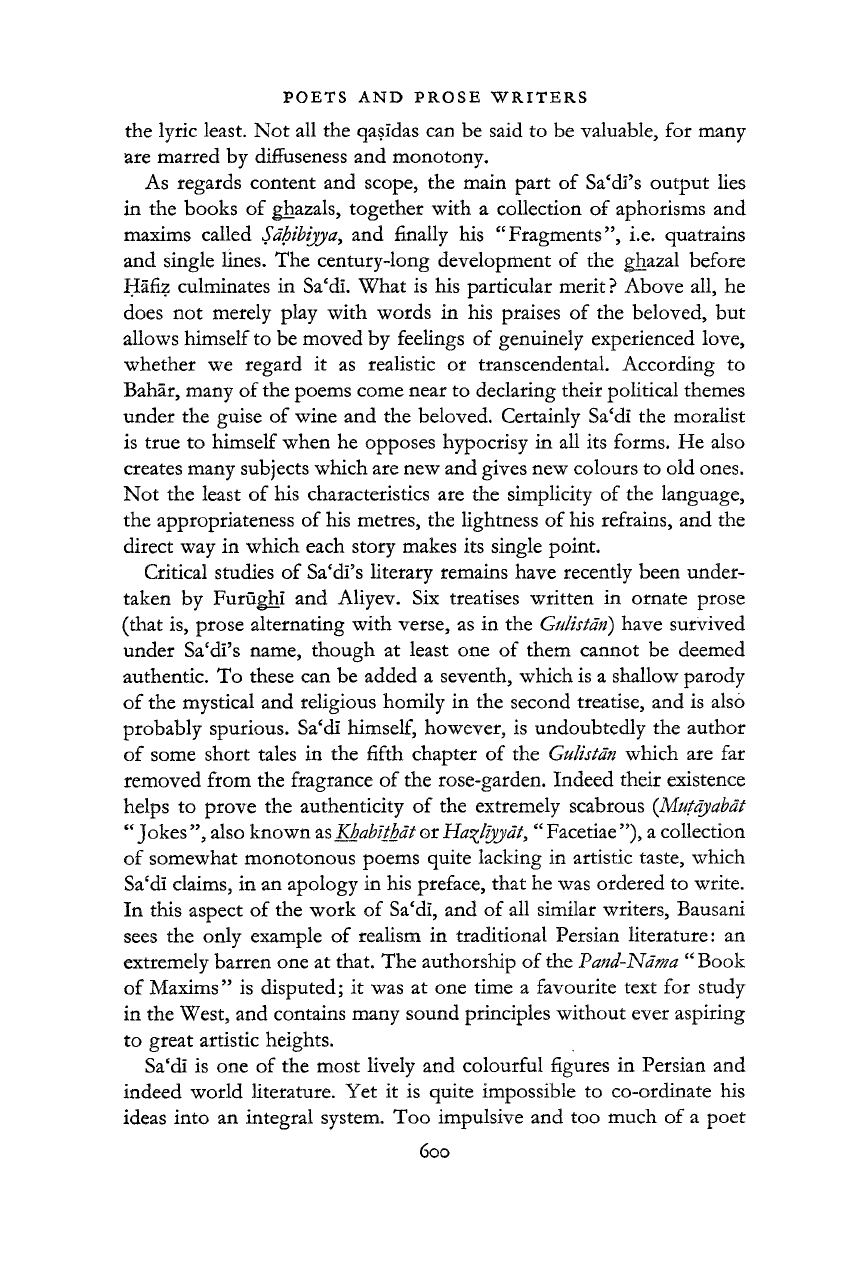
POETS
AND
PROSE WRITERS
600
the lyric least.
Not all the
qasidas
can be
said
to be
valuable,
for
many
are marred
by
diffuseness
and
monotony.
As regards content
and
scope,
the
main part
of
Sa'di's output lies
in
the
books
of
ghazals, together with
a
collection
of
aphorisms
and
maxims called Sdhibiyja,
and
finally
his
"Fragments",
i.e.
quatrains
and single lines.
The
century-long development
of the
ghazal before
Hafiz culminates
in
Sa'di. What
is his
particular merit
?
Above
all, he
does
not
merely play with words
in his
praises
of the
beloved,
but
allows himself to
be
moved
by
feelings
of
genuinely experienced love,
whether
we
regard
it as
realistic
or
transcendental. According
to
Bahar, many
of
the poems come near
to
declaring their political themes
under
the
guise
of
wine
and the
beloved. Certainly Sa'di
the
moralist
is true
to
himself when
he
opposes hypocrisy
in all its
forms.
He
also
creates many subjects which are
new
and gives
new
colours
to old
ones.
Not
the
least
of his
characteristics
are the
simplicity
of the
language,
the appropriateness
of
his metres,
the
lightness
of
his refrains,
and the
direct
way in
which each story makes
its
single point.
Critical studies
of
Sa'di's literary remains have recently been under-
taken
by
Furughi
and
Aliyev.
Six
treatises written
in
ornate prose
(that
is,
prose alternating with verse,
as in the
Gulistdn) have survived
under Sa'di's name, though
at
least
one of
them cannot
be
deemed
authentic.
To
these
can be
added
a
seventh, which
is a
shallow parody
of
the
mystical
and
religious homily
in the
second treatise,
and is
also
probably spurious. Sa'di himself, however,
is
undoubtedly
the
author
of some short tales
in the
fifth chapter
of the
Gulistdn which
are far
removed from
the
fragrance
of
the rose-garden. Indeed their existence
helps
to
prove
the
authenticity
of the
extremely scabrous (Mutdyabdt
" Jokes
",
also known as
Khabithdt or
Ha^liyjdt,
"
Facetiae
"),
a
collection
of somewhat monotonous poems quite lacking
in
artistic taste, which
Sa'di claims,
in an
apology
in his
preface, that
he was
ordered
to
write.
In this aspect
of the
work
of
Sa'di,
and of all
similar writers, Bausani
sees
the
only example
of
realism
in
traditional Persian literature:
an
extremely barren
one at
that.
The
authorship
of
the
Pand-Ndma "
Book
of Maxims"
is
disputed;
it was at one
time
a
favourite text
for
study
in
the
West,
and
contains many sound principles without ever aspiring
to great artistic heights.
Sa'di
is one of the
most lively
and
colourful figures
in
Persian
and
indeed world literature.
Yet it is
quite impossible
to
co-ordinate
his
ideas into
an
integral system.
Too
impulsive
and too
much
of a
poet
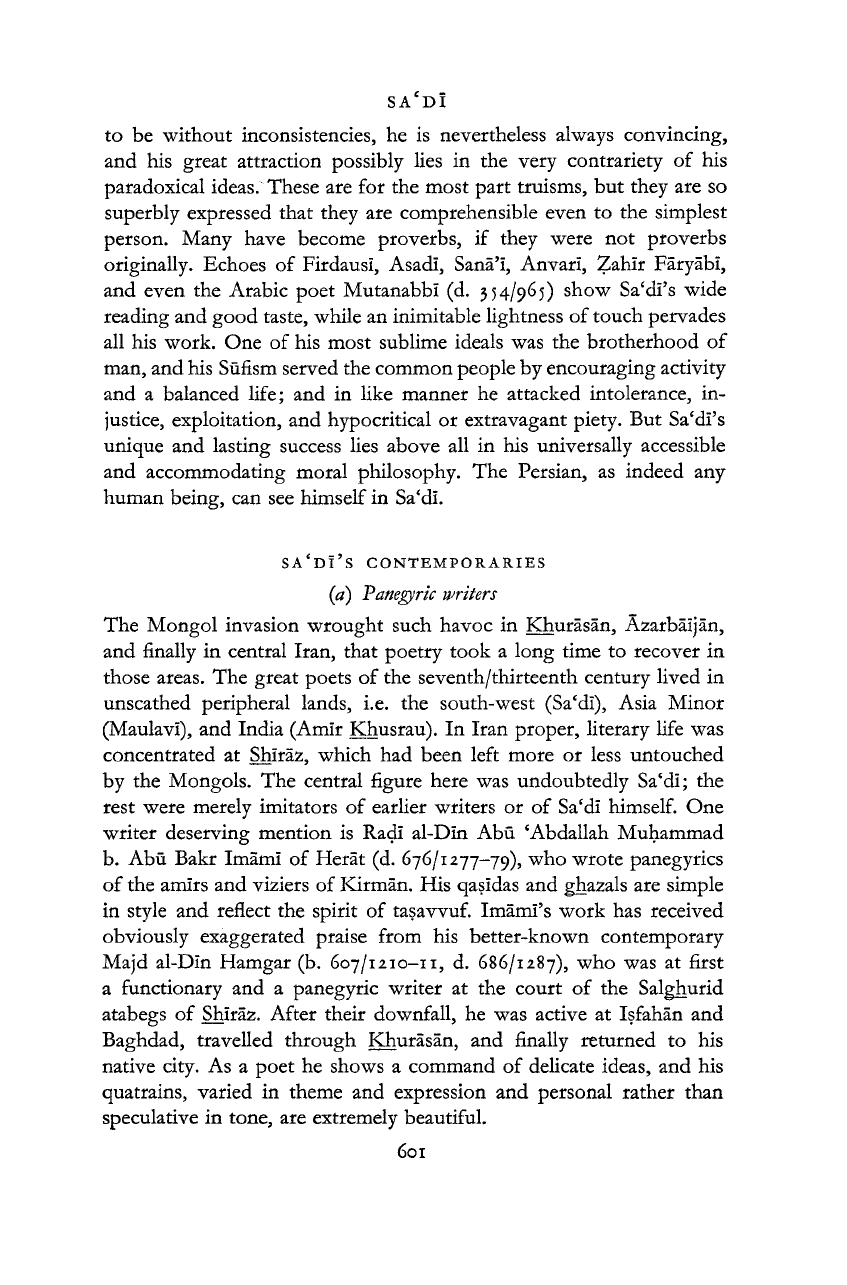
SA'DI
601
to be without inconsistencies, he is nevertheless always convincing,
and his great attraction possibly lies in the very contrariety of his
paradoxical ideas. These are for the most
part
truisms, but they are so
superbly expressed
that
they are comprehensible even to the simplest
person. Many have become proverbs, if they were not proverbs
originally.
Echoes of Firdausi,
Asadí,
Saná'í, Anvarí, Zahir Fáryabl,
and even the Arabic poet Mutanabbi (d. 354/965) show Sa'dfs wide
reading and good taste, while an inimitable lightness of touch pervades
all
his work. One of his most sublime ideals was the brotherhood of
man, and his Süfism served the common people by encouraging activity
and a balanced
life;
and in like
manner
he attacked intolerance, in-
justice,
exploitation, and hypocritical or extravagant piety. But Sa'di's
unique and lasting success lies above all in his universally accessible
and accommodating moral philosophy. The Persian, as indeed any
human being, can see himself in Sa'dL
SA'DI'S
CONTEMPORARIES
(a)
Panegyric
writers
The
Mongol invasion wrought such havoc in Khurasan, Ázarbáíján,
and finally in central
Iran,
that
poetry took a long time to recover in
those areas. The great poets of the seventh/thirteenth century lived in
unscathed peripheral lands, i.e. the south-west (Sa'di),
Asia
Minor
(Maulavi),
and India (Amir Khusrau). In
Iran
proper, literary
life
was
concentrated at Shiraz, which had been left more or less untouched
by
the Mongols. The central figure here was undoubtedly Sa'di; the
rest were merely imitators of earlier writers or of Sa'di himself. One
writer deserving mention is Radi
al-Dín Abü 'Abdallah Muhammad
b.
Abü Bakr Imami of Herat (d.
676/1277-79),
who wrote panegyrics
of
the amirs and viziers of Kirmán. His qasidas and ghazals are simple
in style and reflect the spirit of tasavvuf. Imami's work has received
obviously
exaggerated praise from his better-known contemporary
Majd
al-Din Hamgar (b.
607/1210-11,
d. 686/1287), who was at first
a functionary and a panegyric writer at the court of the Sal
ghurid
atabegs of Shiráz. After their downfall, he was active at Isfahan and
Baghdad,
travelled through Khurasan, and finally
returned
to his
native city. As a poet he shows a command of delicate ideas, and his
quatrains, varied in theme and expression and personal
rather
than
speculative in tone, are extremely beautiful.
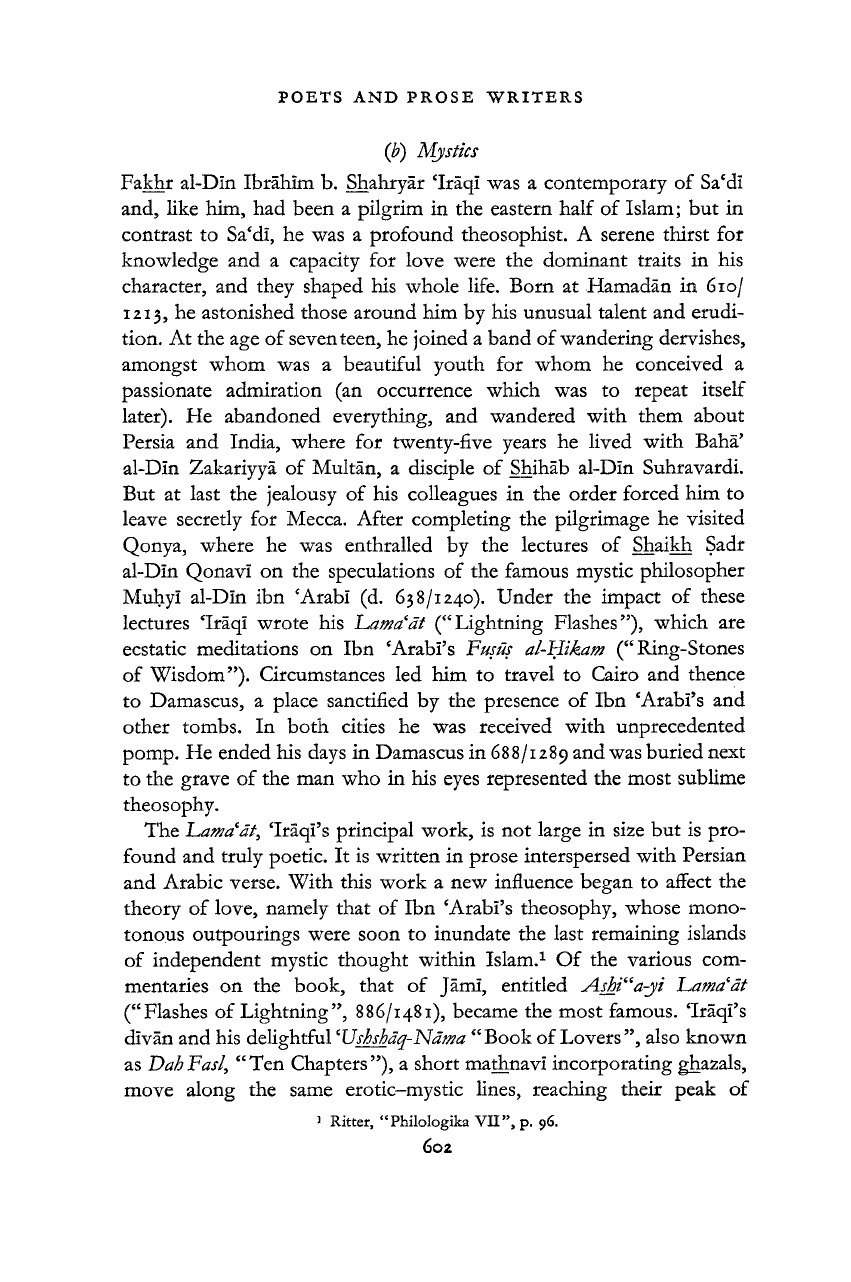
POETS AND PROSE WRITERS
Q?)
Mystics
Fakhr al-Din Ibrahim b. Shahryar 'Iraqi was a contemporary of Sa'di
and, like him, had been a pilgrim in the eastern half of Islam; but in
contrast to Sa'di, he was a profound theosophist. A serene
thirst
for
knowledge
and a capacity for love were the dominant
traits
in his
character, and they shaped his whole
life.
Born at Hamadan in 610/
1213,
he astonished those around him by his unusual talent and erudi-
tion. At the age of seventeen, he joined a band of wandering dervishes,
amongst whom was a beautiful youth for whom he conceived a
passionate admiration (an occurrence which was to repeat itself
later). He abandoned everything, and wandered with them about
Persia and India, where for twenty-five years he lived with Baha'
al-Din
Zakariyya of Multan, a disciple of Shihab al-Din Suhravardi.
But
at last the jealousy of his colleagues in the order forced him to
leave
secretly for Mecca. After completing the pilgrimage he visited
Qonya,
where he was enthralled by the lectures of Shaikh Sadr
al-Din
Qonavi on the speculations of the famous mystic philosopher
Muhyi
al-Din ibn 'Arab! (d. 638/1240). Under the impact of these
lectures Iraqi wrote his
Lama'dt
("Lightning Flashes"), which are
ecstatic meditations on Ibn 'Arabi's Fusils
al-Hikam
("Ring-Stones
of
Wisdom"). Circumstances led him to travel to Cairo and thence
to Damascus, a place sanctified by the presence of Ibn 'Arabi's and
other tombs. In both cities he was received with unprecedented
pomp. He ended his days in Damascus in 688/1289 and was buried next
to the grave of the man who in his eyes represented the most sublime
theosophy.
The
iMmcfdt,
'Iraqi's principal work, is not large in size but is pro-
found and truly poetic. It is written in prose interspersed with Persian
and Arabic verse. With this work a new influence began to affect the
theory of
love,
namely
that
of Ibn 'Arabi's theosophy, whose mono-
tonous outpourings were soon to
inundate
the last remaining islands
of
independent mystic thought within Islam.
1
Of the various com-
mentaries on the book,
that
of
Jami,
entitled Ashi"a-yi
~Lamcfdt
("Flashes of Lightning", 886/1481), became the most famous. 'Iraqi's
divan and his delightful '
Ushshdq-Ndma
"Book
of
Lovers",
also known
as Dab Fas/, " Ten Chapters
"),
a short mathnavi incorporating ghazals,
move
along the same erotic-mystic lines, reaching their peak of
J
Ritter,
"Philologika
VII", p. 96.
602
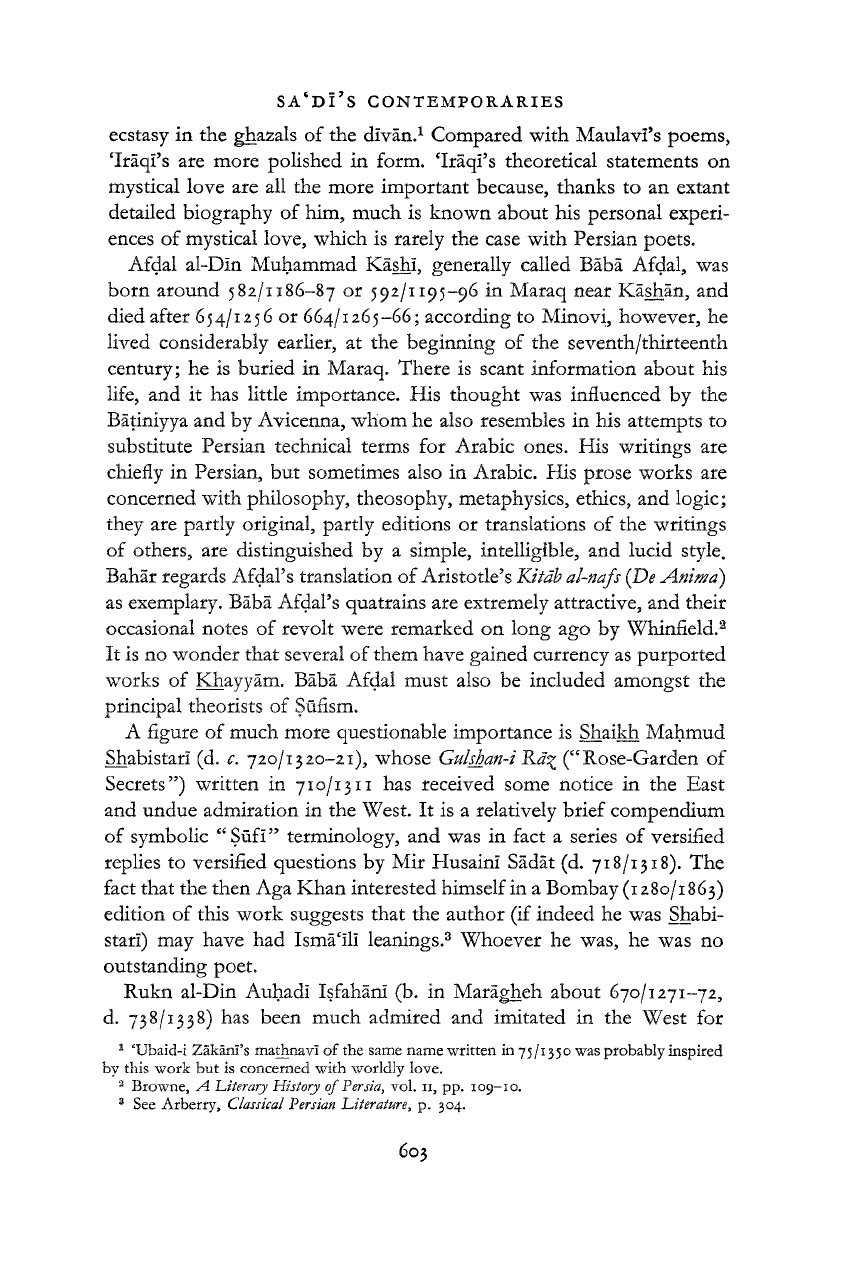
SA'DI'S
CONTEMPORARIES
ecstasy in the ghazals of the divan.
1
Compared with Maulavfs poems,
'Iraqi's are more polished in form. 'Iraqi's theoretical statements on
mystical
love are all the more important because, thanks to an extant
detailed biography of him, much is known about his personal experi-
ences of mystical
love,
which is rarely the case with Persian poets.
Afdal
al-Din Muhammad Kashi, generally called Baba
Afdal,
was
born around 582/1186-87 or 592/1195-96 in Maraq near Kashan, and
died after 654/1256 or 664/1265-66; according to Minovi, however, he
lived
considerably earlier, at the beginning of the seventh
/thirteenth
century; he is buried in Maraq. There is scant information about his
life,
and it has little importance. His thought was influenced by the
Batiniyya
and by
Avicenna,
whom he also resembles in his
attempts
to
substitute Persian technical
terms
for Arabic ones. His writings are
chiefly
in Persian, but sometimes also in Arabic. His prose works are
concerned with philosophy, theosophy, metaphysics, ethics, and
logic;
they are partly original, partly editions or translations of the writings
of
others, are distinguished by a simple, intelligible, and lucid style.
Bahar regards
Afdal's
translation of Aristotle's Kitdb al-nafs (De
Animd)
as exemplary. Baba
Afdal's
quatrains
are extremely attractive, and their
occasional
notes of revolt were remarked on long ago by Whinfield.
2
It is no wonder
that
several of them have gained currency as purported
works
of Khayyam. Baba
Afdal
must also be included amongst the
principal theorists of Sufism.
A
figure of much more questionable importance is Shaikh Mahmud
Shabistarl (d. c. 720/1320-21), whose Gulshan-i
Rd%
("Rose-Garden of
Secrets") written in
710/1311
has received some notice in the East
and
undue
admiration in the West. It is a relatively brief compendium
of
symbolic
"Sufi"
terminology, and was in fact a series of versified
replies to versified questions by Mir Husaini Sadat (d.
718/1318).
The
fact
that
the
then
Aga Khan interested himself in a Bombay (1280/1863)
edition of this work suggests
that
the
author
(if indeed he was Shabi-
starl) may have had Isma'ili leanings.
3
Whoever he was, he was no
outstanding poet.
Rukn al-Din Auhadi Isfahan! (b. in Maragheh about
670/1271-72,
d. 738/1338) has been much admired and imitated in the West for
1
'Ubaid-i
Zakanfs
mathnavi
of the
same
name
written
in
75/1350
was
probably
inspired
by
this
work
but is
concerned
with
worldly
love.
2
Browne,
A.
Literary
History
of
Persia,
vol. n, pp.
109-10.
3
See
Arberry,
Classical
Persian
Literature,
p. 304.
603
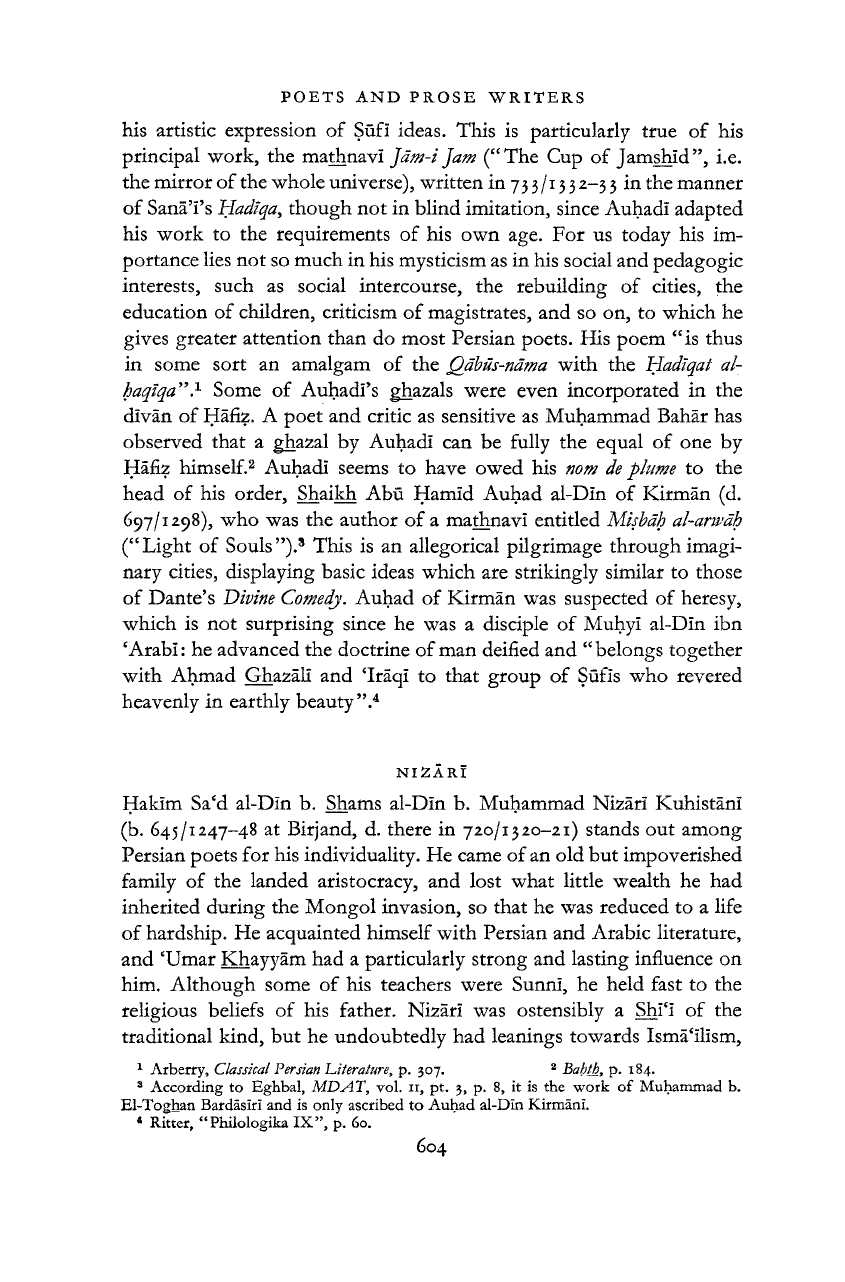
POETS AND PROSE WRITERS
his artistic expression of Sufi ideas. This is particularly
true
of his
principal work, the mathnavi
Jdm-i
Jam ("The Cup of
Jamshid",
i.e.
the mirror of the whole universe), written in
733/133
2-3
3
in the
manner
of
Sana'i's Hadtqa, though not in blind imitation, since Auhadi adapted
his work to the requirements of his own age. For us today his im-
portance lies not so much in his mysticism as in his social and pedagogic
interests, such as social intercourse, the rebuilding of cities, the
education of children, criticism of magistrates, and so on, to which he
gives
greater attention
than
do most Persian poets. His poem "is
thus
in some sort an amalgam of the Qdbus-ndma with the Hadlqat al-
haqiqa".
1
Some of Auhadi's ghazals were even incorporated in the
divan of Hafiz. A poet and critic as sensitive as Muhammad Bahar has
observed
that
a ghazal by Auhadi can be fully the equal of one by
Hafiz
himself.
2
Auhadi seems to have owed his nom
de
plume to the
head of his order, Shaikh Abu Hamid Auhad al-Din of Kirman (d.
697/1298),
who was the
author
of a mathnavi entitled Misbdh
al-anvdh
("Light of Souls").
8
This is an allegorical pilgrimage through imagi-
nary cities, displaying basic ideas which are strikingly similar to those
of
Dante's Divine
Comedy.
Auhad of Kirman was suspected of heresy,
which
is not surprising since he was a disciple of Muhyl al-Din ibn
'Arab!:
he advanced the doctrine of man deified and " belongs together
with
Ahmad Ghazali and 'Iraqi to
that
group of Sufis who revered
heavenly
in earthly beauty".
4
NIZARI
Hakim Sa'd al-Din b. Shams al-Din b. Muhammad Nizari Kuhistani
(b.
645/1247-48 at Birjand, d.
there
in 720/1320-21)
stands
out among
Persian poets for his individuality. He came of an old but impoverished
family
of the landed aristocracy, and lost what little wealth he had
inherited during the Mongol invasion, so
that
he was reduced to a
life
of
hardship. He acquainted himself with Persian and Arabic literature,
and 'Umar Khayyam had a particularly strong and lasting influence on
him. Although some of his teachers were Sunni, he held fast to the
religious
beliefs of his father. Nizari was ostensibly a Shi'i of the
traditional kind, but he undoubtedly had leanings towards Isma'illsm,
1
Arberry,
Classical
Persian
Literatim,
p. 307.
2
Bahth,
p. 184.
3
According
to
Eghbal,
MDAT,
vol. 11, pt. 3, p. 8, it is the
work
of
Muhammad
b.
El-Toghan
Bardasiri
and is
only
ascribed
to
Auhad
al-Din
Kirmani.
*
Ritter,
"Philologika
IX", p. 60.
604
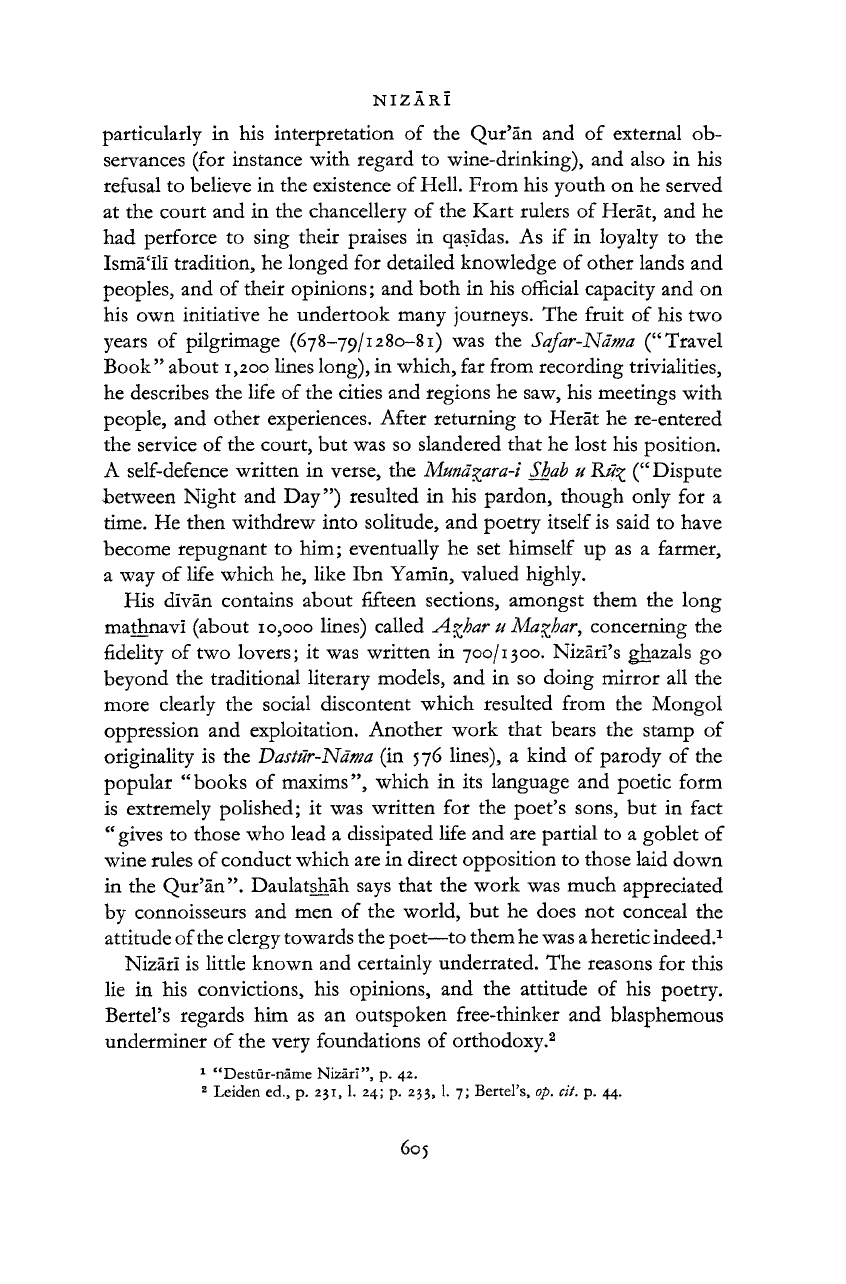
NIZARI
605
particularly in his interpretation of the Qur'an and of external ob-
servances
(for instance with regard to wine-drinking), and also in his
refusal to believe in the existence of
Hell.
From his youth on he served
at the court and in the chancellery of the Kart rulers of Herat, and he
had perforce to sing their praises in qasidas. As if in loyalty to the
Isma'ill
tradition, he longed for detailed knowledge of other lands and
peoples,
and of their opinions; and both in his
official
capacity and on
his own initiative he undertook many journeys. The fruit of his two
years
of pilgrimage (678-79/1280-81) was the
Safar-Ndma
(" Travel
Book"
about 1,200 lines long), in which, far from recording trivialities,
he describes the
life
of the cities and regions he saw, his meetings with
people,
and other experiences. After returning to Herat he re-entered
the service of the court, but was so slandered
that
he lost his position.
A
self-defence written in verse, the
Mund%ara-i
Shah u
Ru%
(" Dispute
between
Night and Day") resulted in his pardon, though only for a
time. He
then
withdrew into solitude, and poetry itself is said to have
become
repugnant to him; eventually he set himself up as a farmer,
a way of
life
which he, like Ibn Yamin, valued highly.
His divan contains about fifteen sections, amongst them the long
mathnavi (about
10,000
lines) called A%har u Maghar, concerning the
fidelity
of
two lovers; it was written in 700/1300. Nizari's ghazals go
beyond
the traditional literary models, and in so doing mirror all the
more clearly the social discontent which resulted from the Mongol
oppression and exploitation. Another work
that
bears the stamp of
originality
is the Dastur-Ndma (in 576 lines), a kind of parody of the
popular "books of maxims", which in its language and poetic form
is
extremely polished; it was written for the poet's sons, but in fact
"
gives
to those who lead a dissipated
life
and are partial to a goblet of
wine
rules of conduct which are in direct opposition to those laid down
in the Qur'an". Daulatshah says
that
the work was much appreciated
by
connoisseurs and men of the world, but he does not conceal the
attitude
of
the
clergy
towards the poet—to them he was a heretic indeed.
1
Nizari
is little known and certainly
underrated.
The reasons for this
lie
in his convictions, his opinions, and the
attitude
of his poetry.
Bertel's
regards him as an outspoken free-thinker and blasphemous
underminer of the very foundations of orthodoxy.
2
1
"Destur-name
Nizari",
p. 42.
2
Leiden
ed., p. 231, 1. 24; p. 233, 1. 7;
Bertel's,
op. cit. p. 44.
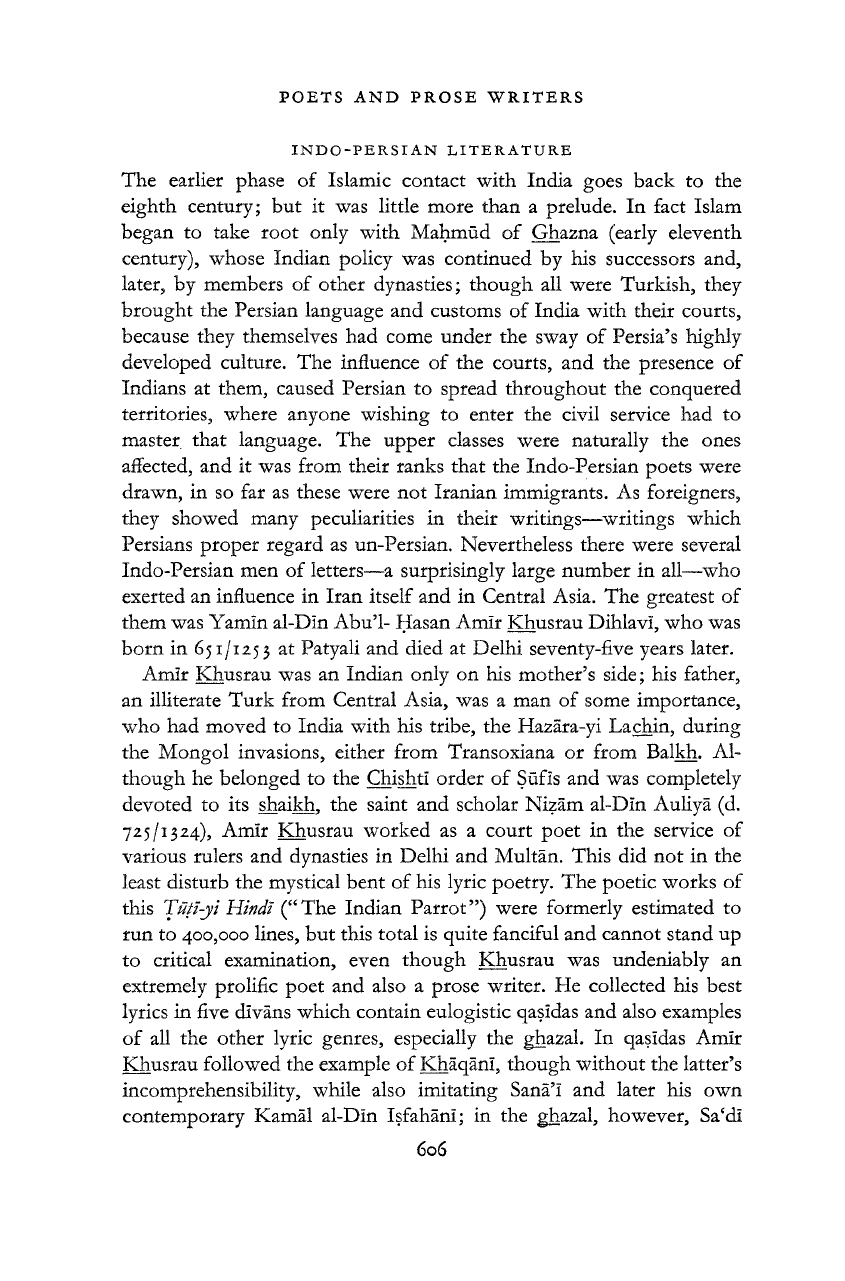
POETS
AND
PROSE
WRITERS
INDO-PERSIAN LITERATURE
The
earlier phase of Islamic contact with India goes back to the
eighth century; but it was little more
than
a prelude. In fact Islam
began
to take root only with Mahmud of Ghazna (early eleventh
century),
whose Indian policy was continued by his successors and,
later, by members of other dynasties; though all were Turkish, they
brought the Persian language and customs of India with their courts,
because they themselves had come
under
the sway of Persia's highly
developed
culture. The influence of the courts, and the presence of
Indians at them, caused Persian to spread throughout the conquered
territories, where anyone wishing to
enter
the
civil
service had to
master
that
language. The upper classes were naturally the ones
affected,
and it was from their ranks
that
the Indo-Persian poets were
drawn, in so far as these were not
Iranian
immigrants. As foreigners,
they showed many peculiarities in their writings—writings which
Persians proper regard as un-Persian. Nevertheless
there
were several
Indo-Persian men of letters—a surprisingly large number in all—who
exerted an influence in
Iran
itself and in Central
Asia.
The greatest of
them was Yamin al-Din
Abu'l-
Hasan Amir Khusrau
Dihlavi,
who was
born in
651/1253
at Patyali and died at Delhi seventy-five years later.
Amir
Khusrau was an Indian only on his mother's side; his father,
an illiterate Turk from Central
Asia,
was a man of some importance,
who
had moved to India with his tribe, the Hazara-yi
La
chin,
during
the Mongol invasions, either from Transoxiana or from Balkh. Al-
though he belonged to the Chishti order of Sufis and was completely
devoted
to its shaikh, the saint and scholar Nizam al-Din
Auliya
(d.
725/1324),
Amir Khusrau worked as a court poet in the service of
various
rulers and dynasties in Delhi and Multan. This did not in the
least
disturb
the mystical bent of his lyric poetry. The poetic works of
this
Tuti-yi
Hindi ("The Indian Parrot") were formerly estimated to
run to
400,000
lines, but this total is quite fanciful and cannot
stand
up
to critical examination, even though Khusrau was undeniably an
extremely
prolific poet and also a prose writer. He collected his best
lyrics
in
five
divans which contain eulogistic qasidas and also examples
of
all the other lyric genres, especially the ghazal. In qasidas Amir
Khusrau followed the example of Khaqani, though without the latter's
incomprehensibility, while also imitating Sana'i and later his own
contemporary Kamal al-Din IsfahanI; in the ghazal, however, Sa'di
606
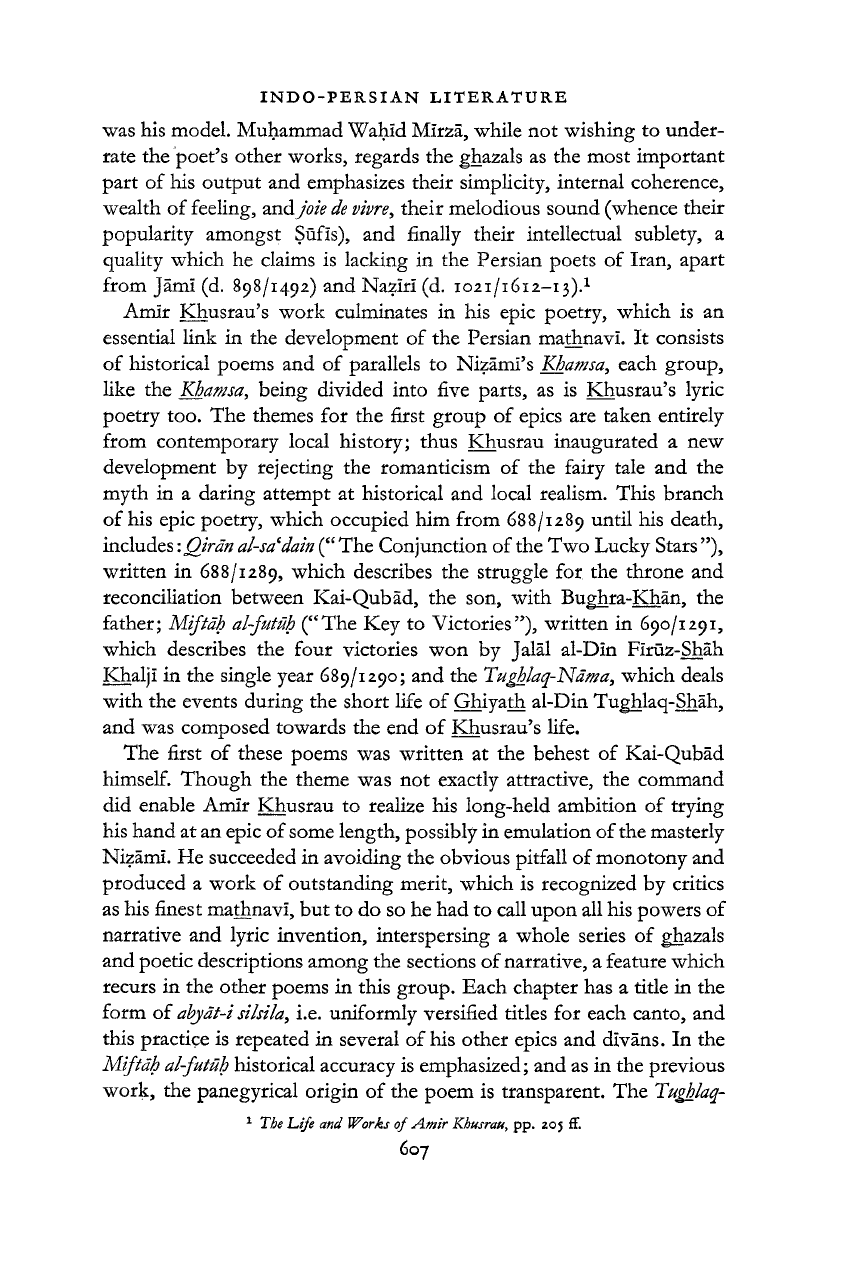
INDO-PERSIAN
LITERATURE
was
his
model. Muhammad Wahid Mirza, while
not
wishing
to
under-
rate
the
poet's other works, regards
the
ghazals
as the
most important
part
of
his output
and
emphasizes their simplicity, internal coherence,
wealth
of
feeling,
and
joie
de
vivre,
their melodious sound (whence their
popularity amongst
Sufis),
and
finally their intellectual sublety,
a
quality which
he
claims
is
lacking
in the
Persian poets
of
Iran,
apart
from
Jam!
(d.
898/1492)
and
Naziri
(d.
1021/1612-13).
1
Amir
Khusrau's work culminates
in his
epic poetry, which
is an
essential link
in the
development
of the
Persian mathnavi.
It
consists
of
historical poems
and of
parallels
to
Nizaml's Khamsa
s
each group,
like
the
Khamsa, being divided into
five
parts,
as is
Khusrau's lyric
poetry too.
The
themes
for the
first group
of
epics
are
taken entirely
from
contemporary local history;
thus
Khusrau inaugurated
a new
development
by
rejecting
the
romanticism
of the
fairy tale
and the
myth
in a
daring
attempt
at
historical
and
local realism. This branch
of
his epic poetry, which occupied
him
from 688/1289 until
his
death,
includes
\Qirdn
al-scfdain
(" The Conjunction of the Two
Lucky
Stars
"),
written
in
688/1289, which describes
the
struggle
for the
throne
and
reconciliation
between Kai-Qubad,
the son,
with Bughra-Khan,
the
father; Miftdh
al-futuh
("The Key
to
Victories"), written
in
690/1291,
which
describes
the
four victories
won by
Jalal al-Din Firuz-Shah
Khalji
in the
single year 689/1290;
and the
Tughlaq-Ndma, which deals
with
the
events during
the
short
life
of
Ghiyath al-Din Tughlaq-Shah,
and was composed towards
the end of
Khusrau's
life.
The
first
of
these poems
was
written
at the
behest
of
Kai-Qubad
himself. Though
the
theme
was not
exactly attractive,
the
command
did enable Amir Khusrau
to
realize
his
long-held ambition
of
trying
his
hand
at an
epic of some length, possibly
in
emulation
of
the masterly
Nizami.
He
succeeded
in
avoiding
the
obvious pitfall of monotony
and
produced
a
work
of
outstanding merit, which
is
recognized
by
critics
as his finest mathnavi,
but to do so he had to
call upon all his powers of
narrative
and
lyric invention, interspersing
a
whole series
of
ghazals
and poetic descriptions among
the
sections
of
narrative,
a
feature which
recurs
in the
other poems
in
this group. Each chapter
has a
title
in the
form
of
abydt-i
si/si/a,
i.e.
uniformly versified titles
for
each canto,
and
this practice
is
repeated
in
several
of
his other epics
and
divans.
In the
Miftdh
al-futuh
historical accuracy is emphasized;
and
as
in the
previous
work,
the
panegyrical origin
of the
poem
is
transparent.
The
Tughlaq-
1
The
Life
and Works of Amir
Khusrau,
pp. 205 ff.
607
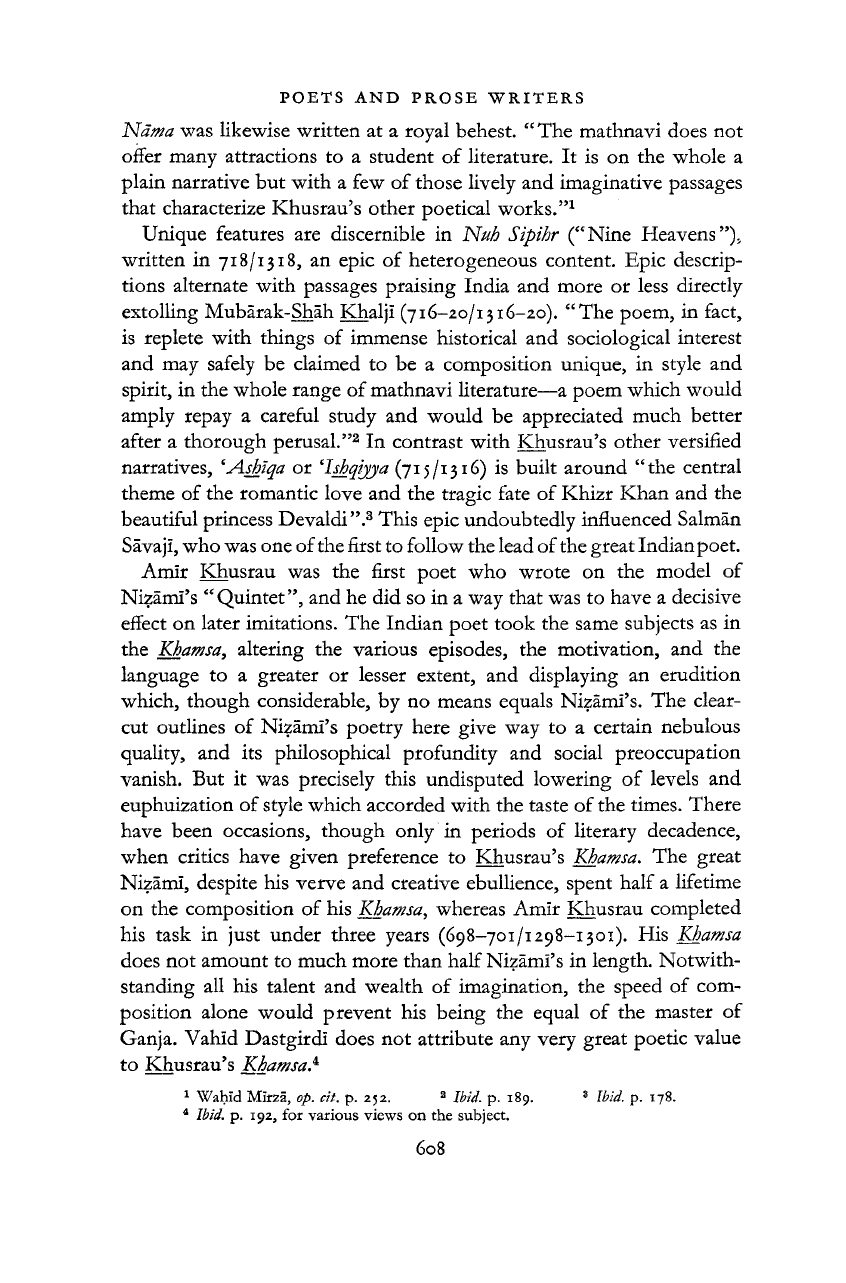
POETS
AND PROSE WRITERS
608
Ndma
was likewise written at a royal behest. " The mathnavi does not
offer
many attractions to a
student
of literature. It is on the whole a
plain narrative but with a few of those
lively
and imaginative passages
that
characterize Khusrau's other poetical works."
1
Unique features are discernible in Nuh Sipihr ("Nine Heavens")>
written in
718/1318,
an epic of heterogeneous content. Epic descrip-
tions
alternate
with passages praising India and more or less directly
extolling
Mubarak-Shah Khalji
(716-20/1316-20).
"The poem, in fact,
is
replete with things of immense historical and sociological interest
and may safely be claimed to be a composition unique, in style and
spirit, in the whole range of mathnavi literature—a poem which would
amply
repay a careful study and would be appreciated much better
after a thorough perusal."
2
In contrast with Khusrau's other versified
narratives, 'Ashiqa or
'Ishqiyya
(715/1316)
is built around " the central
theme of the romantic love and the tragic fate of Khizr Khan and the
beautiful princess Devaldi".
3
This epic undoubtedly influenced Salman
Savaji,
who was one
of
the first to
follow
the lead
of
the great Indian poet.
Amir
Khusrau was the first poet who wrote on the model of
Nizami's
"Quintet", and he did so in a way
that
was to have a decisive
effect
on later imitations. The Indian poet took the same subjects as in
the Khamsa, altering the various episodes, the motivation, and the
language
to a greater or lesser extent, and displaying an erudition
which,
though considerable, by no means equals Nizami's. The clear-
cut outlines of Nizami's poetry here
give
way to a certain nebulous
quality,
and its philosophical profundity and social preoccupation
vanish.
But it was precisely this undisputed lowering of levels and
euphuization of style which accorded with the
taste
of the times. There
have
been occasions, though only in periods of literary decadence,
when
critics have given preference to Khusrau's Khamsa. The great
Nizami,
despite his verve and creative ebullience, spent half a lifetime
on the composition of his
Khamsa, whereas Amir Khusrau completed
his task in just
under
three
years
(698-701/1298-1301).
His Khamsa
does not amount to much more
than
half
Nizami's
in length. Notwith-
standing all his talent and wealth of imagination, the speed of com-
position alone would prevent his being the equal of the master of
Ganja.
Vahid Dastgirdi does not
attribute
any very great poetic value
to Khusrau's Khamsa.*
1
Wahid
Mirza,
op. cit. p. 252.
2
Ibid.
p. 189.
3
Ibid.
p. 178.
4
Ibid.
p. 192, for
various
views
on the
subject.
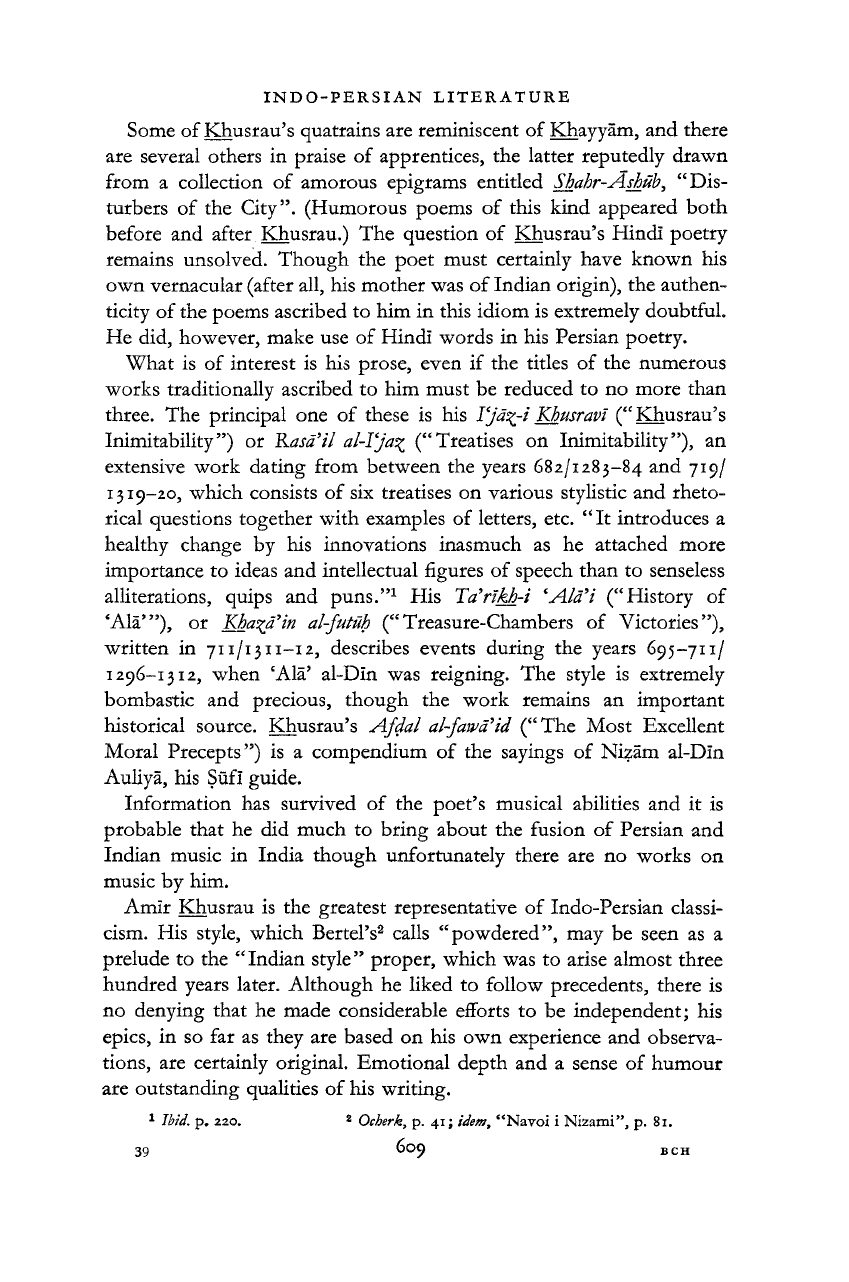
INDO-PERSIAN LITERATURE
Some
of Khusrau's
quatrains
are reminiscent of
Khayyam,
and
there
are several others in praise of apprentices, the latter reputedly drawn
from
a collection of amorous epigrams entitled Shahr-Ashub,
"Dis-
turbers
of the
City".
(Humorous poems of this kind appeared both
before
and after Khusrau.) The question of Khusrau's Hindi poetry
remains unsolved. Though the poet must certainly have known his
own
vernacular (after all, his mother was of Indian origin), the authen-
ticity
of the poems ascribed to him in this idiom is extremely doubtful.
He did, however, make use of Hindi words in his Persian poetry.
What
is of interest is his prose, even if the titles of the numerous
works
traditionally ascribed to him must be reduced to no more
than
three. The principal one of these is his Pjd^-i Khusravi (" Khusrau's
Inimitability") or Rasd'il al-Yja^ (" Treatises on Inimitability"), an
extensive
work dating from between the years 682/1283-84 and 719/
1319-20,
which consists of six treatises on various stylistic and rheto-
rical
questions together with examples of letters, etc. "It introduces a
healthy change by his innovations inasmuch as he attached more
importance to ideas and intellectual figures of speech
than
to senseless
alliterations, quips and puns."
1
His Tcfríkh-i 'Ala'i ("History of
'Ala'"),
or КЬа^аЧп
al-futuh
("Treasure-Chambers of
Victories"),
written in
711/1311-12,
describes events during the years
695-711/
1296-1312,
when 'Ala' al-Din was reigning. The style is extremely
bombastic and precious, though the work remains an important
historical source. Khusrau's Afdal al-fawa'id ("The Most Excellent
Moral
Precepts") is a compendium of the sayings of Nizam al-Din
Auliyá,
his
Sufi
guide.
Information has survived of the poet's musical abilities and it is
probable
that
he did much to bring about the fusion of Persian and
Indian music in India though unfortunately
there
are no works on
music by him.
Amir
Khusrau is the greatest representative of Indo-Persian classi-
cism.
His style, which BertePs
2
calls "powdered", may be seen as a
prelude to the "Indian style" proper, which was to arise almost
three
hundred
years later. Although he liked to
follow
precedents,
there
is
no denying
that
he made considerable efforts to be independent; his
epics,
in so far as they are based on his own experience and observa-
tions, are certainly original. Emotional depth and a sense of humour
are outstanding qualities of his writing.
1
Ibid.
p. 220.
2
Ocberk,
p. 41;
idem,
"Navoi
i
Nizami",
p. 81.
39 6°9 вен
